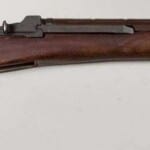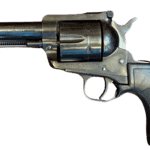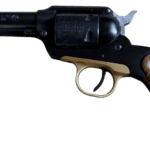
Rock-Ola and the M1 Carbine: The Unlikely Partnership of Jukeboxes and Firearms in WWII
The genesis of Rock-Ola Manufacturing Corporation resides within the vision of one man, David Cullen Rockola. Originally from Canada, Rockola migrated to the United States, settling in Chicago, where he founded his company in 1927. Initially, the business focused on coin-operated machines, such as slot machines and scales. Rockola's breakthrough came in the 1930s when he started manufacturing jukeboxes, a product line that quickly became iconic and synonymous with the Rock-Ola name.
Although Rock-Ola's name was cemented in the annals of pop culture through jukeboxes, the company's story takes an unexpected turn with the onset of World War II. War, as it often does, necessitated the conversion of numerous civilian industries to meet the overwhelming demands of the armed forces. Rock-Ola, with its manufacturing capabilities, was not exempt from this widespread repurposing.
In 1941, the United States was plunged into the chaos of WWII following the attack on Pearl Harbor. One of the immediate needs was for small, light, but powerful semi-automatic rifles that could be used by support troops, airborne units, and others who didn't require the full power or size of the standard M1 Garand rifle. Enter the M1 Carbine, a compact .30 caliber firearm developed by the Winchester Repeating Arms Company.
Due to the high demand, it was impossible for Winchester to meet the production requirements alone. Therefore, the War Production Board initiated a contract for ten companies to manufacture the M1 Carbine. Among them, one would not expect to find a name known for musical entertainment: Rock-Ola.
How did Rock-Ola, a company previously engaged in the amusement industry, become a producer of military firearms? The answer lies in the company's substantial manufacturing capacity and metalworking expertise. The machinery and skills used to create jukeboxes were surprisingly well-suited for gun production, making the transition feasible. However, retooling its facilities required significant investment and adaptation, including acquiring specialized equipment and training its workforce to ensure every rifle met stringent military specifications.
Once the shift was decided, the result was a successful production run from 1942 to 1945. In total, Rock-Ola produced 228,500 M1 Carbines during the war, a small but significant fraction of the over six million carbines produced by all manufacturers. Because all M1 Carbine parts were designed to be interchangeable among manufacturers, extreme precision was required, and Rock-Ola managed to meet these stringent demands consistently.
Early in its production run, Rock-Ola encountered difficulties related to heat-treating processes, leading to minor quality control issues with certain parts. However, these challenges were quickly addressed, and their carbines soon gained a reputation for their finely machined receivers. Rock-Ola sourced some of its barrels from Buffalo Arms and used stocks produced by subcontractors such as Overton.
In addition to Rock-Ola and Winchester, the eight other companies enlisted for M1 Carbine production were Inland Manufacturing Division of General Motors, Underwood Elliot Fisher, IBM, Quality Hardware Manufacturing Corp., National Postal Meter, Standard Products, Saginaw Steering Gear Division of General Motors, and Irwin-Pedersen. Inland was the leading contributor, producing over 2.6 million carbines, nearly half of the total made during the war.
Markings and Collector Significance
One of the distinguishing features of Rock-Ola M1 Carbines is their receiver markings, which bear the distinctive "ROCK-OLA" name. These markings, along with their relatively low production numbers, make Rock-Ola carbines highly desirable among collectors today. Serial number ranges include: first block 1,662,250 to 1,762,519 and second block 4,532,100 to 4,632,099. Because of the smaller production volume, original, unmodified Rock-Ola carbines can command premium prices on the collector market.
Rock-Ola M1 Carbines saw extensive service in the European and Pacific theaters of World War II. After the war, the company's carbines continued to see use in the Korean War and even in the early years of the Vietnam War. Many were supplied to allied nations as part of U.S. military aid programs.
Post-war, Rock-Ola returned to its roots, resuming the production of jukeboxes and other coin-operated machines. However, its contribution to the war effort in the form of M1 Carbines had permanently etched its name into a unique niche of WWII history, forever associating the maker of jukeboxes with the weaponry of the Greatest Generation.
The story of Rock-Ola's involvement in the production of the M1 Carbine during WWII is a tale of industry adaptation and versatility in the face of global crisis. A jukebox manufacturer's transition into a military firearm producer underscores the profound societal and industrial impact that war brings. While Rock-Ola is revered for its classic jukeboxes, its invaluable contribution to the war effort through the production of M1 Carbines should not be forgotten, further enhancing the company's rich and multifaceted legacy.
Sources and References:
- Canfield, Bruce N. Complete Guide to the M1 Carbine. Andrew Mowbray Publishers, 2010.
- Ruth, Larry L. War Baby! The U.S. Caliber .30 Carbine, Volumes 1 & 2. Collector Grade Publications, 1992.
- War Department. Technical Manual TM 9-1276: U.S. Carbine, Caliber .30, M1, M1A1, M2, and M3. U.S. Government Printing Office, 1947.
- McCollum, Ian. "M1 Carbine History and Production." Forgotten Weapons, 2018.
- U.S. Ordnance Department Production Reports, 1942-1945.
Want to meet with other enthusiasts and join discussion on this topic? Here are some forums:
If you know of any forums or sites that should be referenced on this listing, please let us know here.




